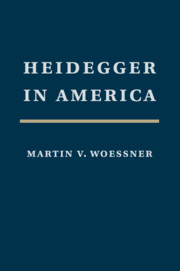Book contents
- Frontmatter
- Contents
- Preface
- Introduction: Being Here
- 1 Freiburg Bound
- 2 Exiles and Emissaries
- 3 Nihilism, Nothingness, and God
- 4 An Officer and a Philosopher
- 5 Dasein and das Man
- 6 The Continental Divide
- 7 Richard Rorty and the Riddle of the Book that Never Was
- 8 Ethics, Technology, and Memory
- 9 Culture Wars
- Conclusion: Being There
- Index
- References
4 - An Officer and a Philosopher
J. Glenn Gray and the Postwar Introduction of Heidegger into American Thought
Published online by Cambridge University Press: 04 February 2011
- Frontmatter
- Contents
- Preface
- Introduction: Being Here
- 1 Freiburg Bound
- 2 Exiles and Emissaries
- 3 Nihilism, Nothingness, and God
- 4 An Officer and a Philosopher
- 5 Dasein and das Man
- 6 The Continental Divide
- 7 Richard Rorty and the Riddle of the Book that Never Was
- 8 Ethics, Technology, and Memory
- 9 Culture Wars
- Conclusion: Being There
- Index
- References
Summary
What to make of Heidegger as a thinker is a baffling question, perhaps especially to those who have little use for his character.
J. Glenn GrayIf the American philosopher Jesse Glenn Gray is remembered at all today, it is for his 1959 book The Warriors: Reflections on Men in Battle. Gray wrote The Warriors in order to heal, as he put it in the foreword to the 1970 reprint of the work, “the intellectual wounds of World War II.” They were, by all accounts, deep wounds. The war was a formative moment in Gray's life. He had served the duration of it as a counterintelligence officer before returning to the United States to pursue a career in philosophy. He spent time in Italy, North Africa, France, and eventually Germany, where he stayed on after the war as part of the reconstruction effort. Gray kept detailed notebooks during these years, and when he finally sat down to write The Warriors, he used these to help ground his phenomenological examination of modern warfare in the most concrete terms possible. Only by remaining true to the realities of total war could he begin to heal the wounds of war, wounds reopened, in the late 1960s at least, by evening news reports from Southeast Asia.
Although writing The Warriors may have been therapeutic for Gray, it was not immediately apparent that the book would enjoy much of a public reception.
- Type
- Chapter
- Information
- Heidegger in America , pp. 132 - 159Publisher: Cambridge University PressPrint publication year: 2010

